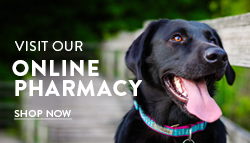Blog

Most pet owners shiver at the thought of parvovirus in their puppies. It is a contagious virus that takes your once very healthy and active puppy into a fatal case of despair and severe illness in a few days.
Younger dogs and puppies are the most affected by the virus as the immunity they get from their mothers starts going away when they are at 12 to 16 weeks. Puppies are usually very susceptible as they lose their mother-given immunity at 10 weeks old. Fortunately, there is prevention for the disease. If caught early enough, your veterinarian can treat it.
What Is Parvovirus?
Parvovirus is a deadly gastrointestinal disease. It is infectious in puppies. The veterinary community finds it dreadful as it can spread fast through the puppy population. The virus is dangerous as it starts shedding four to five days after exposure before your puppy shows any signs of infection.
Quarantine is an essential factor for a puppy with the virus. Your puppy will shed it while sick and even up to 10 days after their recovery. Segregating is ideal for their good and that of other dogs.
Symptoms of Parvovirus
Once your puppy begins showing symptoms, they have already become very sick. Ideally, contact your veterinarian if you notice your puppy displaying the following symptoms:
Vomiting
Weakness
Weight loss
Bloody diarrhea
Dehydration
Fever
Lethargy
Depression
Loss of Appetite
Spread
Parvovirus is very contagious and causes severe gastrointestinal symptoms. It spreads from infected puppies or dogs through the feces.
Asymptomatic dogs can still spread the parvovirus. The same can also happen for dogs that show symptoms and those who have recovered from the disease recently.
Parvovirus is very infectious, and human beings may also spread it unknowingly. They do so when they interact with infected puppies or dogs and touch the healthy ones. A simple pat can cause a life-threatening condition in your puppy.
Risks
Infected feces increase exposure to parvovirus among pets. Your puppy may become infected yet still not show any symptoms for up to one week, but they will still be infectious. The virus can live in the soil outdoors for a year, while it can only survive for one month indoors.
Veterinarians advise that you refrain from taking your puppy outdoor. Do so until you take all the necessary preventative measures to reduce the risk of the disease, such as getting vaccinated. A puppy with low immunity is bound to become infected.
Prevention
You can prevent parvovirus spread in two ways. First, you can get your puppy vaccinated if your veterinarian confirms that they are old enough. Doing so will reduce the spread of the virus, and the puppies who become infected experience the disease in its mild form. Vaccination has made parvovirus a risk instead of a plague for many puppies.
Ensure your puppy gets all the four vaccinations necessary to have a strong immunity as they keep growing from an early age. They should get vaccinated at six weeks, followed by another one every three weeks until they reach 16 weeks old.
Second, you can quarantine your puppy if you begin noticing parvovirus symptoms and they are too young to get vaccinated. Keep them away from other people and dogs to reduce the virus spread.
For more information about parvovirus in pups and how to prevent it, contact Bergen County Veterinary Center at our office in Waldwick, New Jersey. You can call 201-205-2500 to book an appointment today.






